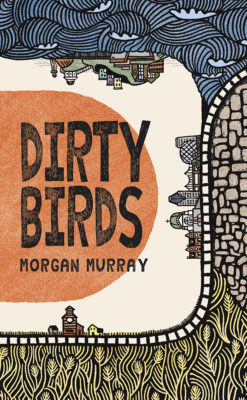Where were you when you learned that Leonard Cohen had died? For Montrealers, this is an epochal question. Even though in his last years he spent most of his time on the road or in California, he was always a figure of speculation in the city. He was sighted with a plate of poached eggs at the back of Bagel Etc or enjoying the sun, cat-like, in Parc du Portugal. It is still hard to imagine this enduring figure – half cad, half prophet – succumbing to something as prosaic as death. Four years later, he is still the closest thing the city has to a secular saint.
Leonard Cohen is alive, well, and, to everyone’s surprise, brandishing a six-shooter engraved with Hallelujah in author Morgan Murray’s debut novel Dirty Birds. In 2007, Milton Ontario is a new arrival to Montreal. Exposed to Cohen’s songs in his high school English class in rural Saskatchewan, he became an instant fan and, lamentably, a poet. A really bad one, as humorously evidenced by the snippets of blank verse throughout the book. After years of dodging a career in the oil patch, Milton has come to his hero’s hometown to enlist in the Mile End bohemia.

Dirty Birds
Morgan Murray
Breakwater Books
$20.99
paper
432pp
9781550818079
Murray has a keen eye and surveys the puppet troupes, noise bands, and guerrilla artists that energized the city in the first decade of the twenty-first century. And while his protagonist is an eager spectator, Milton’s conservative prairie sensibilities don’t jibe with his Millennial cohort’s unrelenting gambolling. He becomes skeptical of his peers and bemoans that “everyone had honed this […] sense of irony to the point that irony became the core principle of their very being.” It seems he just never really quite gets Montreal.
Milton’s life descends into a journey through the nine circles of Montreal-Anglo job hell. He works as a video game tester, call centre operator, plasma donor, and pharmaceutical test subject. His life takes a further turn for the worse when he comes under the influence of his roommate Noddy, a verbose Newfoundlander with no concept of personal boundaries.
A meek main character, Milton is often in retreat, and the book can read like a series of mix-and-match events, rather than a unified story. Milton’s actions frequently have little consequence, and the plot is instead driven by the convenient idiot, Noddy. Murray has a great ear for dialogue and fills the book with the sparkling vernacular of everyone Milton meets, from Alberta minor league hockey hopefuls to Marxist graduate students and Newfoundland cabbies. But these conversations are often of little consequence to Milton’s fate. By the end of the book, the reader might feel about Milton the same way that the woman he spends much of the novel infatuated with does: “I’ve spent all this time with you, and I barely know you. I know about all these things that have happened to you. But […] I don’t know what you see when you look at the world through your eyes.”
It is an unusual structure that suits an unusual protagonist. Dirty Birds is an ambitious debut that humorously chronicles an alternate version of recent Montreal history. mRb






0 Comments